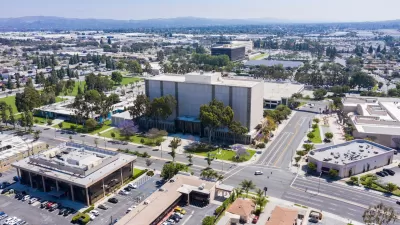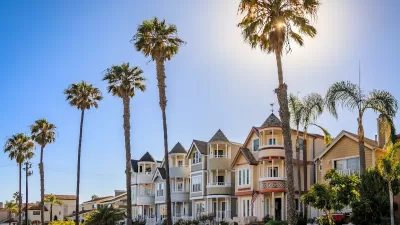The affluent island town has failed to submit a housing element that meets the state’s requirements for affordable housing production.

Writing in the Los Angeles Times, Liam Dillon describes anti-housing efforts in Coronado, California, “arguably the most flagrant resister of a state affordable housing law designed to give housekeepers and others, from teachers to nurses, a chance at an apartment in places that would otherwise be out of their reach.” The city is required to build 912 new housing units, with 70 percent of them deemed affordable.
According to Dillon, “Coronado’s elected officials have thumbed their noses at Gov. Gavin Newsom and state regulators, calling the process “central planning at its worst” and assuring residents that it will be years before the state cracks down.”
And they’re right: the city’s housing plan is two years overdue, with no consequences in sight. “Assuming the state filed a lawsuit and won, the city would have at least another year to comply before monthly fines kicked in and even longer before a court-ordered receiver could take over its permitting and zoning.”
Coronado’s “Median home value tops $2.2 million, according to the real estate website Zillow, and more than a quarter of the households earn over $200,000, U.S. census data show.” More than 25 percent of the island’s residences are vacant at least part of the year. Meanwhile, “It has been more than a decade since new low-income housing was built on the island, though the city recently purchased a duplex it’s converting to affordable housing.”
Stephen Russell, executive director of the San Diego Housing Federation, calls the language used by local condo owners who oppose affordable housing “the distilled liquor of NIMBYism.”
“If the city wanted to, Russell said, it could likely meet its target by allowing more development on church and school lands, promoting backyard homes and casitas, and providing incentives for greater mixed-use development along its main commercial corridor, which mostly features single-story restaurant and retail buildings.”
FULL STORY: This exclusive island town might be California’s biggest violator of affordable housing law

Planetizen Federal Action Tracker
A weekly monitor of how Trump’s orders and actions are impacting planners and planning in America.

Chicago’s Ghost Rails
Just beneath the surface of the modern city lie the remnants of its expansive early 20th-century streetcar system.

San Antonio and Austin are Fusing Into one Massive Megaregion
The region spanning the two central Texas cities is growing fast, posing challenges for local infrastructure and water supplies.

Since Zion's Shuttles Went Electric “The Smog is Gone”
Visitors to Zion National Park can enjoy the canyon via the nation’s first fully electric park shuttle system.

Trump Distributing DOT Safety Funds at 1/10 Rate of Biden
Funds for Safe Streets and other transportation safety and equity programs are being held up by administrative reviews and conflicts with the Trump administration’s priorities.

German Cities Subsidize Taxis for Women Amid Wave of Violence
Free or low-cost taxi rides can help women navigate cities more safely, but critics say the programs don't address the root causes of violence against women.
Urban Design for Planners 1: Software Tools
This six-course series explores essential urban design concepts using open source software and equips planners with the tools they need to participate fully in the urban design process.
Planning for Universal Design
Learn the tools for implementing Universal Design in planning regulations.
planning NEXT
Appalachian Highlands Housing Partners
Mpact (founded as Rail~Volution)
City of Camden Redevelopment Agency
City of Astoria
City of Portland
City of Laramie





























